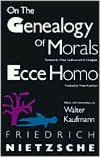On the Genealogy of Morals - Ecce Homo ebook
Par simmons pearl le jeudi, septembre 17 2015, 21:17 - Lien permanent
On the Genealogy of Morals - Ecce Homo by Friedrich Nietzsche, Walter Arnold Kaufmann


Download eBook
On the Genealogy of Morals - Ecce Homo Friedrich Nietzsche, Walter Arnold Kaufmann ebook
Page: 384
Format: pdf
ISBN: 9780679724629
Publisher: Knopf Doubleday Publishing Group
When we consider Nietzsche's suggestion in Ecce Homo that his Thus Spoke Zarathustra[7] could be “reckoned as music” that engendered “a rebirth of the art of hearing,” or that he later referred to it as a “symphony,” it seems plausible to suggest that there may be more to Nietzsche's prose In the Genealogy we are asked to listen to the sound of Nietzsche's hammer as it swings into the idols of morality “as with a tuning fork” and to dance to its Dionysian rhythms. That being noted, I began this text with the later Ecce Homo, not the earlier On The Genealogy of Morals. This is Nietzsche's point in the beginning of the second essay in the Genealogy of Morals: the mnemonic function of suffering in making animals with the right to make promises. The Value of Enemies – To be able to be an enemy presupposes a strong nature; they need resistance and look for it. You must have equality among enemies, as there is no glory in conquering what is beneath you. Such Nietzsche books as On the Genealogy of Morals, The Birth of Tragedy, Untimely Meditations, and Joyful Wisdom are highly valuable, but should be saved till later. In The Genealogy of Morals it's Nietzsche examining the real history of that Bible stuff your lame pastor barks at you in church (which you understand as saying two main things: no sex, no touching yourself) and proving that morality originates not in God but in the will to power—ancient priests seizing power over ancient masters by guilt-tripping them about In Ecce Homo it's those excellent chapter headings (“Why I Am So Clever,” “Why I Write Such Good Books”). Nietzsche's Genealogy, however, is only the second most important modernist fairy tale on the subject of guilt and the .. One can measure the strength of attackers by the opponents he chooses. Ecce Homo, The Case of Wagner, and Nietzsche Contra Wagner should be saved for last. An aggressive pathos is an essential component of strength in the same way that revenge is for the weak. Friedrich Nietzsche, On The Genealogy of Morals and Ecce Homo. He was an itinerant intellectual, living simply in France, Switzerland and Italy and writing his most famous works, including Thus Spake Zarathustra (1885), Beyond Good and Evil (1886), A Genealogy of Morals (1887) and Ecce Homo (1888). On The Genealogy of Morality (Cambridge). Daybreak and Human, All-Too-Human are products of a brief flirtation with certain Enlightenment ideas and are thus quite misleading as introductions. �; Sigmund Freud, Totem and Taboo.